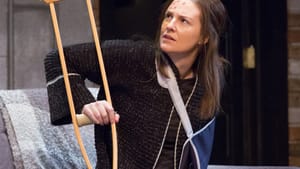Stay in the Loop
BSR publishes on a weekly schedule, with an email newsletter every Wednesday and Thursday morning. There’s no paywall, and subscribing is always free.
Through a lens, darkly
Bristol Riverside Theater presents Donald Margulies's 'Time Stands Still'

War is hell. But, for the couple at the center of Donald Margulies’s Time Stands Still, it’s also home. Susan D. Atkinson’s nuanced and thoughtful production for Bristol Riverside Theatre shows how the stress of civilian life sometimes causes more damage than a roadside bomb.
For more than two decades, photojournalist Sarah Goodwin (Eleanor Handley) has defined herself by her work. After sustaining severe injuries covering the war in Iraq, she’s benched in her Brooklyn apartment indefinitely, chafing under the monotonous routine of physical therapy and visits from well-meaning friends. She wants back in the action — much to the chagrin of her partner James (Michael Satow), a freelance correspondent who would happily abandon embedded life to write cultural criticism.
Sarah can only make sense of life through her camera lens. “When I look through that little rectangle, time stops,” she tells Mandy (Laura Giknis), the girlfriend of her editor and ex-lover Richard (Danny Vaccaro). “It just stands still. Everything around me cuts out. All I see is the picture.” Nothing else approaches that level of certainty.
Margulies introduces questions about the morality of wartime journalism and the relationships between reporters and their subjects. But his primary interest lies in the shifting bonds of Sarah and James’s relationship.
Two become one
After nearly a decade together, James wants to make their union official. Their unmarried status also complicates Sarah’s medical care. “We have been putting ourselves in dangerous situations for years, and we never stopped to think what would happen if one of us got hurt,” James wisely observes.
But as the play progresses, it becomes clear that dangerous situations persist after the bullets stop flying. James naively views marriage as a simplification of their relationship, while Sarah sees it as a conciliation. Margulies suggests they’re both half right.
Jason Simms’s handsomely furnished apartment set is punctuated by floor-to-ceiling windows and exposed brick. However, the space grows increasingly claustrophobic post-nuptials, as Sarah starts to feel her identity slipping away.
Atkinson draws finely detailed character work from Handley and Satow, who are married in real life. Not all legitimate couples can believably translate their relationship to the stage, but the recognizable rapport between them suggests the shorthand of longtime lovers.
War at home
Satow occasionally pushes too-broad humor to capture James’s exasperation, but there’s not a false moment in Handley’s unsympathetic, lived-in performance. Giknis transcends Mandy’s outwardly stereotypical elements to show the heart and humanity beneath the ditzy blonde caricature. Vaccaro balances Richard’s playboy persona with a surfeit of genuine emotion (this helps compensate for him being slightly too young for the role).
Not all of Margulies’s dramatic choices come together smoothly. He suggests that James experienced a mental health crisis prior to Sarah’s injury but never fully explores its ramifications. James’s psychological and spiritual wounds should be more strongly contrasted with Sarah’s literal battle scars.
Elsewhere, the tone shifts to boulevard comedy or treacly melodrama. These diversions are short but noticeable, and they interrupt the dramatic flow of what should be a serious character study. Margulies is also guilty of occasionally sanctifying Sarah — a problem not helped by Joe Doran’s backlit, haloed lighting design.
As a human drama, though, Time Stands Still succeeds by showing strong personalities trying to make sense of life on an unfamiliar battleground. The war at home can be just as destructive as any combat theater.
What, When, Where
Time Stands Still. By Donald Margulies, Susan D. Atkinson directed. Through February 11, 2018, at the Bristol Riverside Theatre, 120 Radcliffe Street, Bristol, Pennsylvania. (215) 785-6664 or brtstage.org.
Sign up for our newsletter
All of the week's new articles, all in one place. Sign up for the free weekly BSR newsletters, and don't miss a conversation.
 Cameron Kelsall
Cameron Kelsall